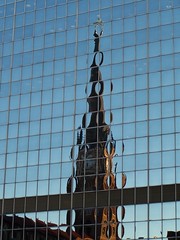Tower of Babel
An excerpt from a sermon on the Tower of Babel, as preached by our brother, Rick, this summer:
What are we building? Where will it end? 25 centuries ago these Hebrew storytellers got it right. “This is only the beginning of what they will do.”
Now I want to be sure I’m not misunderstood. I am not denouncing technology as inherently negative. This sermon was typed at my computer keyboard… So many of us are grateful for the benefits technology has brought us. It is important to acknowledge that most of the remarkable and impressive achievements I mentioned above carry enormous potential for good. Our capacity to create is an aspect of the god-like side of our nature.
But this passage compels us to ask important questions:
*Where is the line between our most worthy innovations and the Towers of Babel that might lead us downward into chaos and confusion?
*How are we to live in a society that knows so much, but is convicted of so little?
*T.S. Eliot phrased the questions this way: “Where is the knowledge that is lost in information? Where is the wisdom that is lost in knowledge?”
If we are not asking these questions, we might be seduced by what a name we have made for ourselves. Here, the biblical story is dripping with irony. Our efforts to unify the world through technology and universal connectedness may just lead us to a more scattered and disconnected and insecure existence.
Does the biblical story offer a sub-version of this story of alienation? It does!
You see, Pentecost is the reversal of Babel!
Note that in the Acts 2 passage, people hear the message about God’s purposes in their own languages. Somehow, God’s spirit transcends the confusion of language and creates a new community, the church.
Ideally, this community is characterized not by its effort to transcend human limitations, but by its ministry to one another, precisely in the midst of our inescapable human condition. Suffering will inevitably befall all of us as finite earthly creatures. When we are being church, our deepest security is found in the way we care for one another.
Look at how the church is portrayed right after this Pentecost event that reverses the Babel process:
“And all who believed were together and had all things in common; they sold their possessions and goods and distributed them to all, as any had need. And day by day, attending the temple together and breaking bread in their homes, they partook of food with glad and generous hearts.” (Acts 2: 43-44)
Ultimately, human unity won’t be built by political or economic systems (although ethical leadership can bring about progress that builds something better than what existed before). When we ascribe to these human creations a finality that they do not have, they invariably end up as domination systems that cause greater confusion. Nor can human security be built by wealth or technology or weaponry or even formal religiosity.
======
by Rick, our beloved brother


0 Comments:
Post a Comment
<< Home